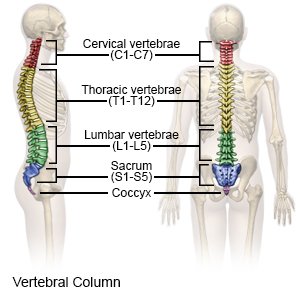Gunshot Wound to the Spine
Medically reviewed by Drugs.com. Last updated on Apr 6, 2025.
What do I need to know about a gunshot wound (GSW) to the spine?
A GSW to the spine may cause vertebrae fractures or spinal cord damage. Vertebrae are the bones that make up your spine.
 |
How are injuries from a GSW to the spine diagnosed?
Your healthcare provider will examine your body to check for injury. Your provider will look to see if you have entrance and exit wounds from the bullet. You may need any of the following tests to diagnose the damage caused by your GSW:
- An x-ray, ultrasound, CT, or MRI may show damage to the structures in your spine. It may also show where the bullet is. You may be given contrast liquid to help your organs or blood vessels show up better in the pictures. Tell the healthcare provider if you have ever had an allergic reaction to contrast liquid. Do not enter the MRI room with anything metal. Metal can cause serious injury. Tell the healthcare provider if you have any metal in or on your body.
- A neuro exam may show damage to your spinal cord. Your hand grasp and leg strength may be tested. Your healthcare provider may test how well you can feel pressure or pain in your arms or legs.
- Blood and urine tests will show how well your kidneys are working. They may also show signs of infection. These tests also give healthcare providers information about your overall condition.
- Surgery may be needed to find damage or find out where you are bleeding from.
How is a minor GSW treated?
A GSW may be minor if it does not go deep into your skin or damage your spine. Your healthcare provider may or not may remove the bullet. Your provider may clean your wound and close it with stitches or staples.
How is a severe GSW treated?
You may need any of the following:
- Medicines may be given to decrease pain and prevent infection. Ask how to take pain medicine safely. You may need steroids to decrease swelling around your spinal cord. You may also be given a tetanus shot. Tetanus is a severe infection caused by bacteria. Tell your healthcare provider if you have had the tetanus vaccine or a tetanus booster within the last 5 years.
- A blood transfusion may be given if you have severe bleeding from your GSW.
- IV fluids may be given to prevent dehydration and increase blood flow to major organs.
- A cervical collar may be put around your neck if you have an injury to your cervical spine. A cervical collar prevents movement and more damage to your spine.
- Bed rest may limit or prevent damage to your spinal cord.
- Surgery may be needed to repair damage to your vertebrae or spinal cord. It may also be needed to clean your GSW or remove the bullet.
How can I care for myself after a GSW to the head or neck?
- Care for your wound as directed. Carefully wash the wound with soap and water. Dry the area and put on new, clean bandages as directed. Change your bandages when they get wet or dirty. Monitor your wound for signs of infection such as redness, swelling, or pus.
- Do range of motion (ROM) exercises as directed. Your healthcare provider may show you or your caregiver how to perform ROM exercises. ROM exercises may prevent your arms or legs from getting stiff or permanently bent.
- Use medical equipment as directed. You may need to use medical equipment, such as a wheelchair, after a GSW to your spine. Ask your healthcare provider how to use medical equipment.
- Physical therapy and occupational therapy may help you improve muscle strength or relearn how to perform activities of daily living (ADLs) after a spinal cord injury. ADLs include bathing, feeding, and getting dressed.
- Get support. It is normal to have difficult and unexpected feelings after being shot or having spinal cord damage. You may have feelings such as anger, depression, fear, or anxiety. You may have nightmares or continue to think about what has happened. Talk to your healthcare provider if you have any of these feelings. Treatments are available to help you.
Call 911 for any of the following:
- You feel lightheaded, short of breath, and have chest pain.
- You cough up blood.
- You have trouble breathing.
When should I seek immediate care?
- Blood soaks through your bandage.
- Your wound comes apart.
- Your arm or leg feels warm, tender, and painful. It may look swollen and red.
- You have weakness in your arms or legs or are not able to walk.
When should I contact my healthcare provider?
- You have a fever.
- Your wound is red, swollen, or draining pus.
- You have nausea or are vomiting.
- You have questions or concerns about your condition or care.
Care Agreement
You have the right to help plan your care. Learn about your health condition and how it may be treated. Discuss treatment options with your healthcare providers to decide what care you want to receive. You always have the right to refuse treatment. The above information is an educational aid only. It is not intended as medical advice for individual conditions or treatments. Talk to your doctor, nurse or pharmacist before following any medical regimen to see if it is safe and effective for you.© Copyright Merative 2025 Information is for End User's use only and may not be sold, redistributed or otherwise used for commercial purposes.
Learn more about Gunshot Wound to the Spine
Care guides
Further information
Always consult your healthcare provider to ensure the information displayed on this page applies to your personal circumstances.
